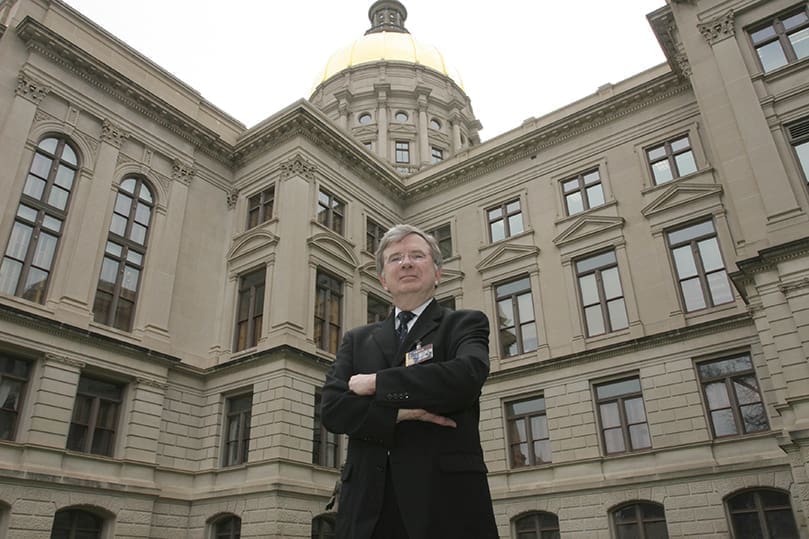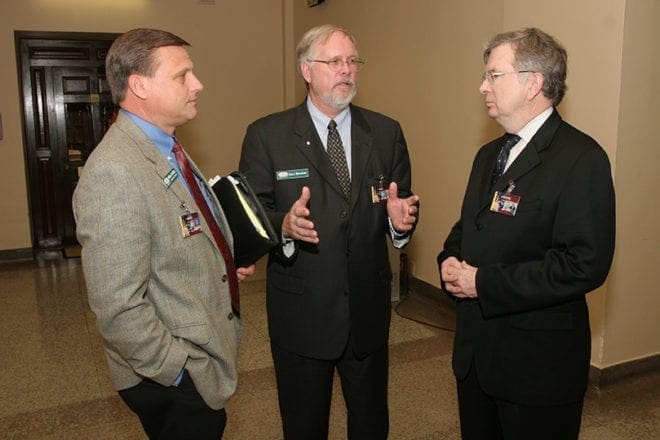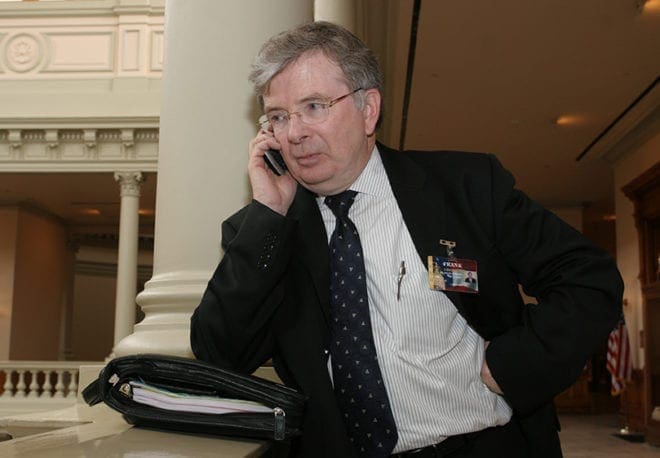 Photo By Michael Alexander
Photo By Michael Alexander
Atlanta
Under Gold Dome, Frank Mulcahy Speaks For Bishops
By Under Gold Dome, Frank Mulcahy Speaks For Bishops | Published April 2, 2009
Later that same day, Mulcahy joined Georgia Right to Life and Christian advocates interested in measures restricting abortion and limiting intentional embryonic stem cell destruction to develop strategy on saving these initiatives.
“I’m there representing the church, the teachings of the church, and the teachings of the church are not entirely represented by either political party or by any one politician,” said Mulcahy, the executive director of the Georgia Catholic Conference.
From anti-abortion issues and the death penalty to education vouchers and immigrant rights, the Catholic Church’s voice is part of the conversations that influence lawmaking.
Scholars on religion and state politics say the church’s vast areas of advocacy encourage partnerships with different special interest groups, its insights are generally respected among lawmakers, and it relies on relationships to influence laws, not campaign money.
The Georgia Catholic Conference, which started in 1972, represents the church in front of state policymakers. It works on behalf of the Diocese of Savannah and the Atlanta Archdiocese.
“The church must be engaged in the public arena and in the development of public policy because we are citizens with a great stake in the issues of our times,” Archbishop Wilton D. Gregory wrote in an e-mail.
In addition, the church has a responsibility to the Gospel to proclaim the truth, he wrote.
The archbishop and Savannah Bishop J. Kevin Boland set the priorities for the conference.

Frank Mulcahy, right, gets an update on a proposed pro-life bill from Dan Becker, center, and Mike Griffin, Georgia Right To Life president and legislative director, respectively. Photo By Michael Alexander
“As Catholics we are called to promote the common good and protect the human dignity of all human persons. One way we do this is through participating in the legislative process,” wrote Bishop Boland in a statement.
He wrote that much of the work of the Georgia House of Representatives and Senate has moral and ethical implications.
The Georgia Catholic Conference “will try to influence and modify legislation so that it is consistent with the common good,” wrote Bishop Boland.
The conference adds a “moral vision” to the nitty-gritty of legislative work, said Mulcahy.
“Our benchmark is our Catholic teaching and, in particular, our Catholic social policy,” he said.
Mulcahy is the only employee of the conference. When the Georgia General Assembly is in session, other leaders of the archdiocese are also at the Statehouse, including the communications director, Pat Chivers, and the pro-life director, Mary Boyert.
Some 120 people took part in Catholic Day at the Capitol in March. Participants learned about the legislative process, key initiatives, and got the opportunity to contact their lawmakers. It is the third year the Catholic Conference organized it.
Chivers said a highlight for her was welcoming about 30 students from St. Anne’s School in Columbus who traveled to Atlanta to experience the legislative process.
“What a tremendous witness they were to the legislators and others at the Capitol!” she wrote in an e-mail.
“Selective And Strategic Action”
Catholics are represented in nearly all state capitals by Catholic conferences. They grew out of a spirit of the Second Vatican Council as bishops collaborated on statewide issues.
Lobbying is one of a conference’s main functions.
David Yamane, a sociologist at North Carolina’s Wake Forest University, said conferences target proposals with “selective and strategic action.”
The success of lobbying for any advocacy group is hard to measure, he said. But Catholic conference lobbyists probably end up on the losing side of votes more often because they advocate for political issues that don’t attract a lot of support, Yamane said.
They see themselves as “acting as the voice for the voiceless (and the) Matthew 25 folks,” said Yamane, who authored “The Catholic Church in State Politics: Negotiating Prophetic Demands and Political Realities.”
“They are not hired guns. They are really conscientious people. They don’t get caught up in the short-term” view of lawmaking, said Yamane.
“Most legislators will agree with a Catholic conference on some issue,” he said.
The diversity of its issues means the church forms “coalitions with everybody” since the church’s goals cross the traditional liberal and conservative political divide, Yamane said.
For instance, what would appear to be a natural alliance between the Catholic Church and other Christian organizations is not always the case.
Mulcahy once received an invitation to join other faith-based groups to rally at the Statehouse steps. He declined.
“There are a lot of thing we disagree with, not all, but some of our fellow Christians,” he said. “I would want to talk about all the issues,” but some in this group opposed certain conference concerns, such as protecting immigrant rights, he said.
A native of Philadelphia, Mulcahy received the Bronze Star during his service as an Army officer in Vietnam. He and his wife, Claudia, moved to the Atlanta area in 1977. They have a son in college. They belong to St. Thomas Aquinas Church, Alpharetta.

Frank Mulcahy is a graduate of St. Joseph University, Philadelphia, Pa., and the George Washington University Law School, Washington, DC. Photo By Michael Alexander
Mulcahy is an attorney at the Tinsley Bacon Tinsley law firm. A lifelong Catholic, Mulcahy has worked on legislative issues for more than 20 years and has led the Catholic Conference since 2002. He is working toward a master’s degree in theology at Spring Hill College at its Atlanta campus.
The conference works to aid people who would otherwise be overlooked, he said.
“In a way, it is part of a vocation because you do it because you believe in it,” he said.
While campaign contributions are often a lobbyist’s shortcut to finding sympathetic lawmakers, the Georgia Catholic Conference avoids the easy road. Because of its tax-free status as a religious organization, the church cannot spend money like other groups at the Capitol.
The IRS limits church spending on political activity. The conference cannot donate money to favored politicians.
The restriction forces the conference to build relations with lawmakers in other ways.
According to Yamane’s book, the average cost of a state Catholic conference in 2002 was $402,659. The average conference spent about 36 cents per Catholic in a state to perform its duties, according to Yamane’s book.
The Atlanta Archdiocese declined to give the conference’s budget. Public records at the State Ethics Commission indicate the conference pays more than $10,000 for lobbying activities. But the conference is thrifty with its money. In 2007, 2008 and so far in 2009, Mulcahy hasn’t filed an expenditure report with the State Ethics Commission for picking up a lunch tab for lawmakers.
The church’s in-depth teaching can add insights to inform lawmakers, said Allen Hertzke, a political scientist and director of religious studies at the University of Oklahoma.
“Catholic leaders who would articulate their concerns could do so from a deep tradition of theological thought about social and political issues,” he said.
Legislators see it as a “valued ally,” he said.
However, the institutional strength has not been translated into a vibrant grassroots network, said Hertzke, currently a visiting scholar at the Pew Forum on Religion and Public Life.
Catholic lobbyists cannot rely on a flood of phone calls or e-mails to representatives at key legislative moments, like evangelical Christian organizations can, he said.